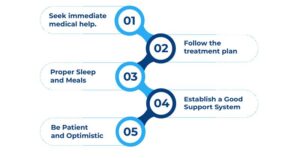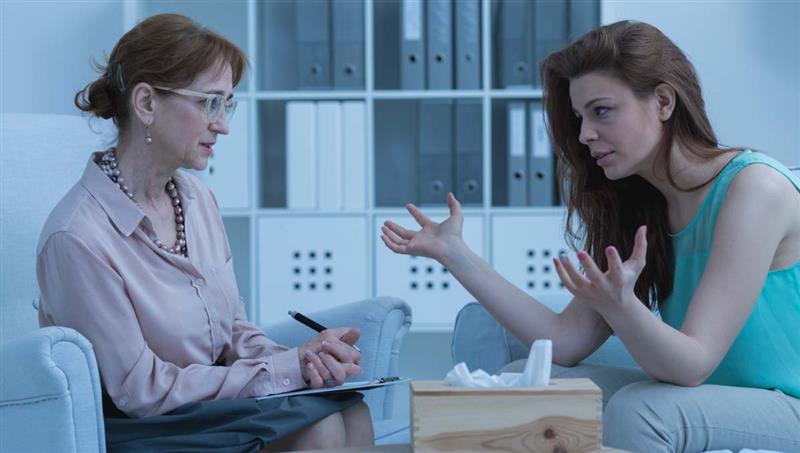Have you ever heard of an illness so strong that it can alter the way a new mother thinks, feels, and behaves following childbirth? It is a serious type of condition that occurs in rare cases after childbirth and is referred to as postpartum psychosis, and it requires medical care urgently. In contrast to the postpartum blues or even postpartum depression, postpartum psychosis may include severe mood swings, confusion, hallucinations, and delusional thoughts.
Typically, it forms days or weeks post-delivery and may rapidly exacerbate when untreated. It is important to know its symptoms, causes, and possible treatment methods to preserve the psychological state of a mother. Stay with us and read the article till the end, and gain useful insights!
What Is Postpartum Psychosis?
A postpartum psychosis is a severe but infrequent mental change that may occur in an infant after having a baby. It normally commences during the initial days or weeks after birth. A woman with a postpartum psychotic episode becomes confused, thinks strange or unusual things, hears voices, or sees things that do not exist. The condition does not resemble the so-called baby blues or the postpartum depression, as the virus has proven to be much more powerful and potentially affects the ability of the mother to take care of herself or her child.
In the same manner, physicians are not aware of the exact reason why it happens. Still, hormonal changes that lead to childbirth, tiredness, or a history of mental disorders in oneself or among family members can all bring susceptibility. With prompt medical attention, which includes the use of medications and, in most cases, hospitalization, most mothers obtain full recovery. Subjection of the parents to the postpartum psychosis can also occur not by the fault of the mother, but obtaining timely assistance can assist in ensuring the safety of the mother and baby. If you or anyone you know is facing the issue of psychosis, you may contact us at MAVA Behavioral Health!
Postpartum Psychosis Symptoms
Here are the signs of postpartum psychosis:
- Having serious mood swings.
- Having perceptions of non-existence (hallucinations).
- Weird or incoherent philosophies (delusions).
- Trouble sleeping, even when the baby is sleeping.
- Extreme restlessness or inability to sit down.
- There is some dislocation of the actual life.
- Concept of self-injury and infant abuse.
Postpartum Psychosis Causes
There are the following causes of postpartum psychosis:
- The drastic and fast-growing hormonal change in childbirth.
- History of mental health disorders, such as bipolar disorder, schizophrenia.
- History of postpartum psychosis in previous pregnancy histories.
- Lactational sleep deprivation to an extreme degree.
- Management’s problems during pregnancy or childbirth are easy.
- Mood and thinking are affected due to sudden alterations in the brain chemistry.
What is the Duration of Postpartum Psychosis?
Postpartum psychosis normally begins a few days or within the first few weeks after childbirth. A good percentage of mothers start realizing a change in a few weeks with the correct treatment. It may, however, take months to heal, and one must follow the line of action in the treatment to prevent another occurrence of the symptoms.
In addition, postpartum psychosis can last a considerable duration when untreated and cause the baby and the mother problems. Therefore, it is rather significant to resort to the solution to help with the very first symptoms. Mothers are highly aided by healthcare providers, family, and friends who help them to get back to their routine ways of life.
Postpartum Psychosis Examples
The following are some real-life manifestations of postpartum psychosis:
- Auditory hallucinations- A new mother may hear voices instructing her that her baby is under any threat and that she needs to take unusual steps to save the baby.
- Perceiving things that images do not see. Often observe shadows, figures, and abnormal light, thinking that they are genuine.
- Robust delusions-A mother can think that her infant is gifted with special powers or that somebody is out to hurt the infant, even when there is no indication.
- Extreme confusion -She may not know where she is, when she has a baby in her arms, may think it is lost, or may even think she is still pregnant after childbirth.
- Rapid mood swings- Her mood can turn on a dime when it comes to being very happy to an extreme.
Tips To Deal with Postpartum Psychosis

1. Seek immediate medical help.
In case you or one of your close people observes the signs of postpartum psychosis, seek medical help immediately. An early diagnosis allows the condition to be treated at an early stage and aids in quick recovery. Physicians can advise medication, therapy, or even hospitalization to be safe. It is possible to save the mother and the baby by acting timely manner.
2. Follow the treatment plan.
Once one has a diagnosis, they should take prescribed medications and be faithful in showing up to therapy sessions. Missing doses or quitting treatment abruptly may lead to reappearance of symptoms. Adherence to the medical recommendations would facilitate in the long run recovery. Consult your doctor before changing your treatment plan.
3. Proper Sleep and Meals
To restore normal condition after childbirth, physical and emotional rest are required, and consequently, it is advised to dedicate oneself to sleep and various healthy diet. Rest helps both the body and the brain to recover from the stress induced by giving birth. A healthy diet regulates the mood and condition. The other family members can also come to the rescue by taking care of the baby temporarily; therefore, the mother also gets to rest.
4. Establish a Good Support System
The difference is quite enormous in being emotionally and practically supported by the family, friends, or support groups. The loneliness would be reduced through the involvement of others who live the same way. Family members can offer companionship, help in covering daily needs and baby care, and they can cheer up.
5. Be Patient and Optimistic
Healings become longer, and the problem of postpartum psychotic episode should be given time; and it is normal to experience the down times as well as the up times during these processes. Working on small improvements each day could keep you motivated. Thinking that they are good as well as having friends and family that give positive pep talks will help overcome the stress and feel more confident. Keep in mind how you will feel well once you take care of it.
Postpartum Mental Health Vs. Postpartum Psychotic Episode
Postpartum Mental Health | Postpartum Psychotic Episode |
| Overall emotional well-being after birth. | Severe mental illness after birth. |
| It occurs days after birth, gradually. | It occurs in patients in 1–2 weeks after birth, suddenly. |
| Mood swings, sadness, anxiety, fatigue. | Hallucinations, delusions, confusion. |
| Can still manage daily tasks. | Unable to care for self or baby. |
| Hormonal shifts, stress, past depression. | Past bipolar, psychosis, family history. |
Postpartum Psychosis Treatment Options
1. Medication Management
The use of medications should be emphasized in the treatment of postpartum psychosis, where the psychosis is accompanied by severe postpartum depression. The immediate remedy to this may involve the use of antipsychotics, mood stabilizers, or antidepressants, which may become effective in stabilizing the mood and overcoming the symptoms.
Furthermore, these medications serve the purpose of reducing confusion, delusions, or other hallucinations to a status where new mothers enjoy sane minds once again. The treatment is safe and productive in terms of the dosage and the regular follow-up, particularly when breastfeeding is taking place. The right medication plan can make the process of recovery much quicker and less invasive.
2. Psychiatric Evaluation
An accurate psychiatric assessment is vital to detecting the signs of postpartum psychosis on time and receiving urgent care. In the process, mental health professionals evaluate the thoughts, feelings, and actions of a patient as they try to establish the extent or severity of the condition.
In addition, it is also possible to examine the personal and family history of mental health to establish triggers. Such a forward strategy guarantees mothers the timely interventions, which enhance their safety and well-being.
Final Thoughts
At MAVA Behavioral Health, postpartum psychosis is normally treated with a combination of medication and a psychiatric examination to ensure a successful recovery. This form of medical care, intersecting with professional assessment, is safe, enhances emotional stability, and results in a greater rate of recovery of the mother in her mental state.
The treatment is never given forcefully, as care and compassion are always given to the mother to make her feel at ease. All procedures are done under close attention to ensure the effectiveness and safety of the treatment. The aim is to restore the mental health of the mother and to achieve an overall improvement in her well-being.
FAQs
What Is Postpartum Psychosis?
Postpartum psychosis is a severe mental condition that is seldom, but very serious postpartum disorder. It entails mental symptoms such as confusion, hallucinations, mood swings, and delusional thoughts.
What Is the Cause of Postpartum Psychosis?
We do not understand the precise cause; however, some factors enhance the possibility of its occurrence, such as hormonal variation, sleep deprivation, and personal or family history of mental illness.
What Are the Treatments of Postpartum Psychosis?
Treatment often involves medicine, e.g., antipsychotics or mood stabilizers, and psyche examination to establish a secure and effective treatment plan.
Is postpartum psychosis avoidable?
Not every case can be prevented, but close attention to high-risk mothers and their medical treatment in time can lower the level of severity and accelerate the recovery process.
Is postpartum depression identical to postpartum psychosis?
No, postpartum psychosis is worse and has symptoms such as hallucinations and delusions, whereas sadness, anxiety, and fatigue are the main symptoms of postpartum depression.









